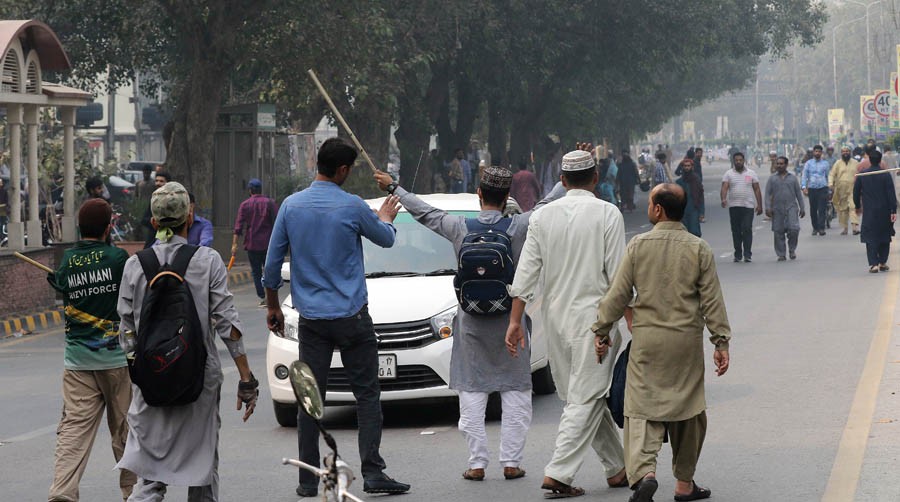
A look at the arrests of TLP leadership, the law applied and future recourse

Two days before the Nov 25 march to Islamabad from Lahore, threatened by the Tehreek-e-Labbaik Pakistan (TLP) leadership, the mood across the country was tense. People were anticipating the club-wielding activists of the TLP would hold the country hostage by blocking roads and highways. What followed was unexpected.
A countrywide crackdown was launched on Nov 23 and a large number of TLP leaders and workers were taken into custody. They were detained under Section 3 of the Maintenance of Public Order Ordinance (MPO), 1960. Under this law, the deputy commissioner of a district can exercise the power of the government and order preventive detention of a person if his activities are found prejudicial to public safety or maintenance of public order. These arrests were in addition to the arrests made on charges of destroying public property, stopping functionaries from performing their duty, blocking roads, violating the clauses of anti-terrorism etc. after the Supreme Court acquitted Aasia Bibi of blasphemy charges.
In the purview of MPO, the arrests of TLP activists have assumed significance. Will related actions work as a deterrent in future? Will there be compromises similar to the ones before?
Journalist and analyst Suhail Warraich says the recent crackdown against TLP is a message for the party, "that nobody can become more powerful than the state institutions". The message, he says, has come mainly from the biggest stakeholder in the country’s power matrix.
Warraich thinks it is not easy to punish a mob leader. "The state will ultimately have to give relief to the TLP leadership, an amicable solution to this standoff, because if that does not happen there are risks of formation of rival groups within the party, spreading of negative sentiments etc."
He adds, as this issue is religiously sensitive, "the state must consider taking a lenient view but warn the accused for future."
Different quarters are demanding strict action against the TLP leadership; such as registration of treason cases against the accused and prosecution under the relevant laws. Lawyers Masroor Shah and Abdullah Malik have approached the Supreme Court and the Lahore high court and have demanded registration of cases under the Army Act, 1952, for treason, contempt of court etc.
Karachi-based lawyer Faisal Siddiqi has demanded to try the TLP leadership for treason charges. "Detention under MPO is a mere joke. It is a preventive measure and has got nothing to do with the crime one has committed or the punishment prescribed for that crime."
Siddiqi challenges the rationale for allowing the status of a political party to TLP, "whose leader has demanded removal of military chief and killing of supreme court judges for performance of their duty. The court banned the National Awami Party (NAP) in 1975 for being anti-state. The same rule applies on TLP".
A police official based in Lahore who is privy to the developments regarding this crackdown shares, "The arrests were expected. We knew the state would come hard on these miscreants one day."
It was the rise and rise of the TLP and the support it got from the state since the Faizabad sit-in, he says, continuing, "it intoxicated its leadership with illusions of absolute power."
He disagrees that the recent crackdown is mere eyewash. "The leadership and followers are being treated differently. A large number of TLP followers have been arrested and presented in courts for physical and judicial remand under different charges whereas there are others who along with their leaders are under preventive detention. Those against whom there is sufficient evidence of crime, like destroying public property, attacking police personnel etc. are not being spared."
He adds, video evidence is also being matched with Nadra record to identify the miscreants.
Muhammad Amir Rana, Director of Islamabad-based Pakistan Institute for Peace Studies (PIPS) stresses that the rule of law must be followed. "If the TLP people get relief according to law it is okay but if there is a compromise just for political reasons it may backfire."
Rana disagrees with the policy of keeping TLP leadership under preventive detention. "It should have been the other way round because it was the leadership that incited followers to take law in their hands."
He suggests the state must recover money from TLP leaders and compensate those whose movable and immovable properties were destroyed during the protests. "The remaining amount must be managed by the state because it failed to protect its citizens".
Last year, the names of TLP leadership were removed from the fourth schedule by the home department much to the surprise of many. There are calls from different quarters to include their names to the list of arrested activists. However, Rana thinks this will work only if the rules are followed in their true sense. "The TLP leadership can be monitored properly if they are made to comply with police reporting condition, their movement is subjected to approval of law enforcing authority, their bank accounts are put under scrutiny etc."